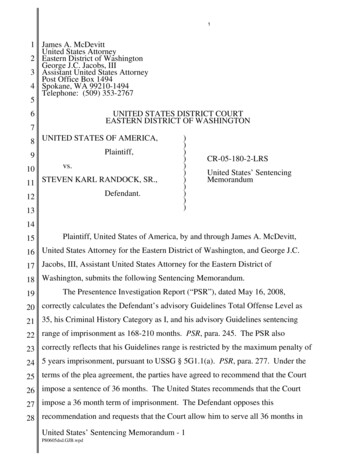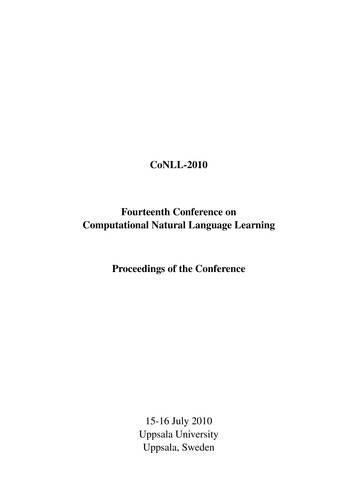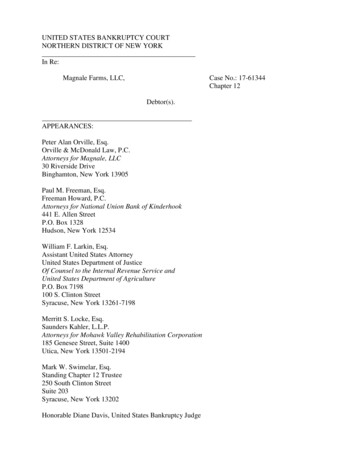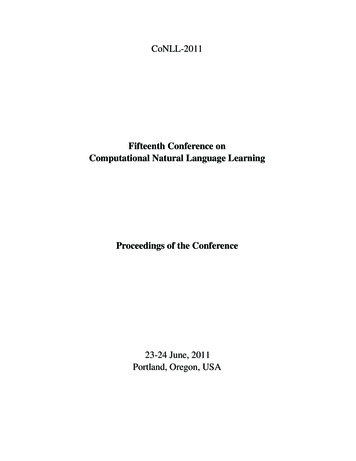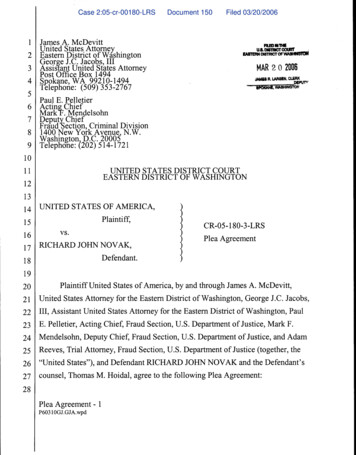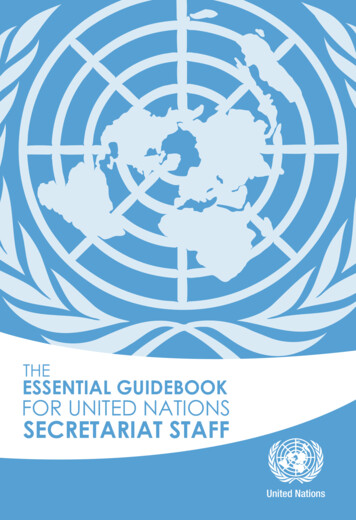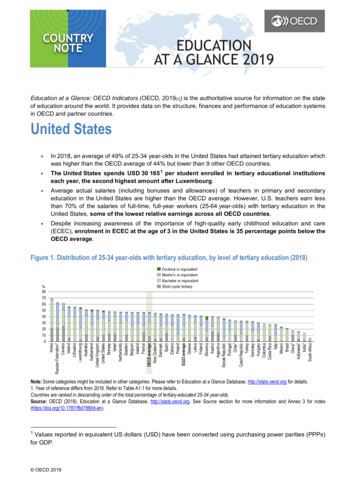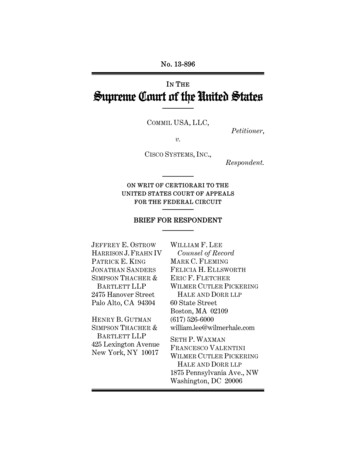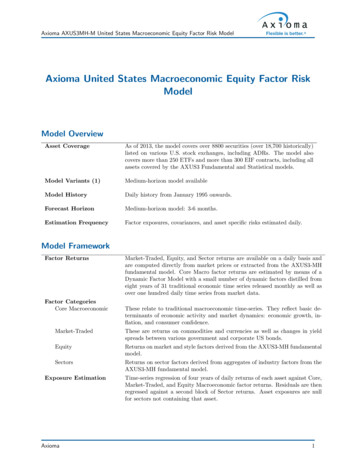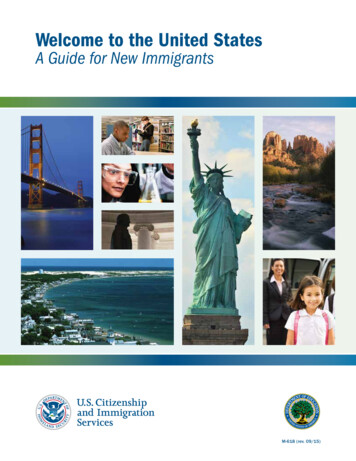
Transcription
Welcome to the United StatesA Guide for New ImmigrantsM-618 (rev. 09/15)
Welcome to the United StatesA Guide for New Immigrants
00U.S. GOVERNMENT OFFICIAL EDITION NOTICEThis is the Official U.S. Government edition of this publication and is hereinidentified to certify its authenticity. Use of the ISBN 978-0-16-092967-0 is forU.S. Government Publishing Office Official Editions only. The Superintendentof Documents of the U.S. Government Publishing Office requests that anyreprinted edition clearly be labeled as a copy of the authentic work with anew ISBN.The information presented in Welcome to the United States: A Guide for New Immigrantsis considered public information and may be distributed or copied withoutalteration unless otherwise specified. The citation should be:U.S. Department of Homeland Security, U.S. Citizenship and ImmigrationServices, Office of Citizenship, Welcome to the United States: A Guide for NewImmigrants, Washington, DC, 2015.U.S. Citizenship and Immigration Services (USCIS) has purchased the rightto use many of the images in Welcome to the United States: A Guide for New Immigrants.USCIS is licensed to use these images on a non-exclusive and non-transferablebasis. All other rights to the images, including without limitation andcopyright, are retained by the owner of the images. These images are not inthe public domain and may not be used except as they appear as part of thisguide.This guide contains information on a variety of topics that are not within thejurisdiction of U.S. Department of Homeland Security (DHS)/USCIS. If youhave a question about a non-DHS/USCIS issue, please refer directly to theresponsible agency or organization for the most current information. Thisinformation is correct at the time of printing, however, it may change in thefuture.For sale by the Superintendent of Documents, U.S. Government Publishing OfficeInternet: bookstore.gpo.gov Phone: toll free (866) 512-1800; DC area (202) 512-1800Fax: (202) 512-2104 Mail: Stop IDCC, Washington, DC 20402-0001I S B N 978-0-16-092967-0
Table of ContentsWelcome to the United States: A Guide for New Immigrants . . . . . . . . . . . . 1Federal Departments and Agencies . . . . . . . . . . . . . . . . . . . . . . . . . . . . . . .2The United States Today . . . . . . . . . . . . . . . . . . . . . . . . . . . . . . . . . . . . . . . .3Federal Holidays . . . . . . . . . . . . . . . . . . . . . . . . . . . . . . . . . . . . . . . . . . . . .4Contact USCIS . . . . . . . . . . . . . . . . . . . . . . . . . . . . . . . . . . . . . . . . . . . . . . .5About This Guide . . . . . . . . . . . . . . . . . . . . . . . . . . . . . . . . . . . . . . . . . . . . . . . . 7Where to Get Help . . . . . . . . . . . . . . . . . . . . . . . . . . . . . . . . . . . . . . . . . . .8USCIS Online Resources . . . . . . . . . . . . . . . . . . . . . . . . . . . . . . . . . . . . . .10Your Rights and Responsibilities as a Permanent Resident . . . . . . . . . . . . 13Your Rights and Responsibilities . . . . . . . . . . . . . . . . . . . . . . . . . . . . . . . .14Maintaining Your Permanent Resident Status . . . . . . . . . . . . . . . . . . . . . . .16If You Are a Conditional Permanent Resident . . . . . . . . . . . . . . . . . . . . . .19Finding Legal Assistance . . . . . . . . . . . . . . . . . . . . . . . . . . . . . . . . . . . . . .21Consequences of Criminal Behavior for Permanent Residents . . . . . . . . . .24Getting Settled in the United States . . . . . . . . . . . . . . . . . . . . . . . . . . . . . . . . 27Get a Social Security Number . . . . . . . . . . . . . . . . . . . . . . . . . . . . . . . . . .28Find a Place to Live . . . . . . . . . . . . . . . . . . . . . . . . . . . . . . . . . . . . . . . . . .30Look for a Job . . . . . . . . . . . . . . . . . . . . . . . . . . . . . . . . . . . . . . . . . . . . . .35Child Care . . . . . . . . . . . . . . . . . . . . . . . . . . . . . . . . . . . . . . . . . . . . . . . . .41Transportation . . . . . . . . . . . . . . . . . . . . . . . . . . . . . . . . . . . . . . . . . . . . .43Taking Care of Your Money . . . . . . . . . . . . . . . . . . . . . . . . . . . . . . . . . . . . . . . 47Personal Finance . . . . . . . . . . . . . . . . . . . . . . . . . . . . . . . . . . . . . . . . . . . .48Paying Taxes . . . . . . . . . . . . . . . . . . . . . . . . . . . . . . . . . . . . . . . . . . . . . . .51Protect Yourself and Your Money . . . . . . . . . . . . . . . . . . . . . . . . . . . . . . . .53Understanding Education and Health Care . . . . . . . . . . . . . . . . . . . . . . . . . . 57Education in the United States . . . . . . . . . . . . . . . . . . . . . . . . . . . . . . . . . .58Higher Education: Colleges and Universities . . . . . . . . . . . . . . . . . . . . . . .65Adult Education . . . . . . . . . . . . . . . . . . . . . . . . . . . . . . . . . . . . . . . . . . . .67Learn English . . . . . . . . . . . . . . . . . . . . . . . . . . . . . . . . . . . . . . . . . . . . . .68Health Care . . . . . . . . . . . . . . . . . . . . . . . . . . . . . . . . . . . . . . . . . . . . . . . .69Other Federal Benefits Programs . . . . . . . . . . . . . . . . . . . . . . . . . . . . . . . .72
Keeping Your Home and Family Safe . . . . . . . . . . . . . . . . . . . . . . . . . . . . . . . 75Be Prepared . . . . . . . . . . . . . . . . . . . . . . . . . . . . . . . . . . . . . . . . . . . . . . . .76Stay Informed . . . . . . . . . . . . . . . . . . . . . . . . . . . . . . . . . . . . . . . . . . . . . .78Respond to an Emergency . . . . . . . . . . . . . . . . . . . . . . . . . . . . . . . . . . . . .79Learning About the United States . . . . . . . . . . . . . . . . . . . . . . . . . . . . . . . . . . 83We the People: The Role of the Citizen in the United States . . . . . . . . . . . .84How the United States Began . . . . . . . . . . . . . . . . . . . . . . . . . . . . . . . . . .85Creating “A More Perfect Union” . . . . . . . . . . . . . . . . . . . . . . . . . . . . . . .87How the Federal Government Works . . . . . . . . . . . . . . . . . . . . . . . . . . . . .90The Legislative Branch: Congress . . . . . . . . . . . . . . . . . . . . . . . . . . . . . . . .91The Executive Branch: The President . . . . . . . . . . . . . . . . . . . . . . . . . . . . .93The Judicial Branch: The Supreme Court . . . . . . . . . . . . . . . . . . . . . . . . . .93State and Local Government . . . . . . . . . . . . . . . . . . . . . . . . . . . . . . . . . . .94Experience the United States . . . . . . . . . . . . . . . . . . . . . . . . . . . . . . . . . . .95Becoming a U .S . Citizen . . . . . . . . . . . . . . . . . . . . . . . . . . . . . . . . . . . . . . . . . . 97Why Become a U.S. Citizen? . . . . . . . . . . . . . . . . . . . . . . . . . . . . . . . . . . .98Naturalization: Becoming a U.S. Citizen. . . . . . . . . . . . . . . . . . . . . . . . . .100You’re on Your Way . . . . . . . . . . . . . . . . . . . . . . . . . . . . . . . . . . . . . . . . .107
Welcome to the United StatesA Guide for New ImmigrantsCongratulations on becoming a permanent resident of the United States ofAmerica! On behalf of the president of the United States and the Americanpeople, we welcome you and wish you every success here.The United States has a long history of welcoming immigrants from all partsof the world. America values the contributions of immigrants who continueto enrich this country and preserve its legacy as a land of freedom andopportunity.As a permanent resident of the United States, you have made a decision to callthis country your home. As you work to achieve your goals, take time to getto know this country, its history, and its people. It is now both your right andyour responsibility to shape the future of the United States and to ensure itscontinued success.Exciting opportunities await you as you begin your life as a permanentresident of this great country. Welcome to the United States!U.S. Citizenship and Immigration Services1
Federal Departments andAgenciesIf you have a question and do not know which department can answer it,call 1-800-FED-INFO (or 1-800-333-4636). If you are hearing impaired, call1-800-326-2996.You can also visit www .usa .gov for general information about federaldepartments and agencies.U.S. Department of Education (ED)Phone: 1-800-USA-LEARNPhone: 1-800-872-5327For hearing impaired: 1-800-437-0833www.ed.govU.S. Department of Housing and Urban Development(HUD)Phone: 202-708-1112For hearing impaired: 202-708-1455www.hud.govU.S. Equal Employment Opportunity Commission (EEOC)U.S. Department of Justice (DOJ)Phone: 1-800-669-4000For hearing impaired: 1-800-669-6820www.eeoc.govPhone: 202-514-2000www.justice.govU.S. Department of Health and Human Services (HHS)Phone: 1-877-696-6775www.hhs.govU.S. Department of the TreasuryInternal Revenue Service (IRS)Phone: 1-800-829-1040For hearing impaired: 1-800-829-4059www.irs.govU.S. Department of Homeland Security (DHS)Phone: 202-282-8000www.dhs.govU.S. Citizenship and Immigration Services (USCIS)Phone: 1-800-375-5283For hearing impaired: 1-800-767-1833www.uscis.govU.S. Customs and Border Protection (CBP)Phone: 202-354-1000www.cbp.govU.S. Immigration and Customs Enforcement (ICE)www.ice.gov2Selective Service System (SSS)Phone: 1-888-655-1825Phone: 847-688-6888For hearing impaired: 847-688-2567www.sss.govSocial Security Administration (SSA)Phone: 1-800-772-1213For hearing impaired: 1-800-325-0778www.socialsecurity.gov or www.segurosocial.gov/espanolU.S. Department of State (DOS)Phone: 202-647-4000For hearing impaired: 1-800-877-8339www.state.gov
The United States orgiaVirginiaNew HampshireMassachusettsRhode IslandConnecticutNew JerseyDelawareMarylandWashington, DCWest VirginiaNorthCarolinaSouth iiThe United States also includes the territories of Guam, American Samoa, theU.S. Virgin Islands, and the commonwealths of the Northern Mariana Islandsand Puerto Rico, which do not appear on this map.3
Federal HolidaysMost federal offices are closed on official holidays. If a holiday falls ona Saturday, it is observed on the preceding Friday. If a holiday falls on aSunday, it is observed on the following Monday. Many non-governmentemployers also give their employees a holiday on these days. The federalgovernment observes the following official holidays.4New Year’s DayJanuary 1Birthday of Martin Luther King, Jr.3rd Monday in JanuaryPresidents’ Day3rd Monday in FebruaryMemorial DayLast Monday in MayIndependence DayJuly 4Labor Day1st Monday in SeptemberColumbus Day2nd Monday in OctoberVeterans DayNovember 11Thanksgiving Day4th Thursday in NovemberChristmas DayDecember 25
Contact USCISVisit the USCIS website at www .uscis .gov and www .welcometousa .gov, aresource for new immigrants.Call Customer Service at 1-800-375-5283 or 1-800-767-1833 (for hearingimpaired).To get forms, visit the USCIS website or call the USCIS Forms Line at1-800-870-3676.5
6
About This GuideThis guide contains basic information to help you settle in the United States and find what you and yourfamily need for everyday life. It also summarizes important information about your legal status and aboutagencies and organizations that provide documents or essential services you may need.7
As a permanent resident, you should begin to learn about this country, itspeople, and its system of government. Use this guide to find out about yourrights and responsibilities as an immigrant and to understand how federal,state, and local governments work. You can also learn about importanthistorical events that have shaped the United States, as well as the importanceof getting involved in your community and suggestions on how to do so.This guide provides a general summary of rights, responsibilities, andprocedures related to permanent residents. To get more specific and detailedinformation, you should consult the laws, regulations, forms, and guidance ofU.S. Citizenship and Immigration Services (USCIS). You should always consultthese more detailed resources for your specific immigration question or case.You can find this information on the USCIS website at www .uscis .gov. Youcan obtain USCIS forms on the website or by calling the USCIS Forms Line at1-800-870-3676. For more information, call Customer Service at 1-800-3755283 or 1-800-767-1833 (for hearing impaired).Where to Get HelpThis guide will help you get started, but it cannot answer all the questionsyou might have about life in the United States. For additional information, youcan contact a state, county, or city government office to learn about availableservices or consult with local organizations that help new immigrants. Youcan find these offices and organizations by using the free resources describedbelow.The Public LibraryPublic libraries in the United States are free andopen to everyone. Libraries are located in almostevery community. The library staff can help youfind information on many topics and can give youa library card that allows you to borrow items, suchas books, DVDs, and other resources, free of charge.Most libraries also have local newspapers for you toread and computers that you can use to access theInternet.8
Some libraries offer free computer classes, English language instruction, andother programs for children and adults. Ask the library staff about the servicesoffered in your community. To find a library near you, visit www .nces .ed .gov.The Phone BookYour local phone book (telephone directory) contains phonenumbers and important information about federal, state, andlocal community services. The phone book has emergencyinformation, local maps, and information about how toget phone service. The white pages list phone numbers ofindividuals and the yellow pages list phone numbers andaddresses for businesses and organizations. You can also dial411 on your phone to get a specific phone number anywherein the United States. You may have to pay a fee when calling411.The InternetThe Internet can link you to many sources of information, including thewebsites of federal, state, and local government agencies. Most governmentwebsites end with “.gov.” If you do not have a computer athome, you can use one in your public library. You can usethe Internet to search for jobs, find housing, learn aboutschools, and locate community organizations andresources to help you. You can also use the Internetto learn about important news and current events,and to discover interesting information about lifein America, U.S. history and government, and yourlocal community. To locate federal governmentresources available to new immigrants, visit www .welcometousa .gov.9
T IPAs an immigrant, you should be aware that dishonest people have made fakewebsites that look like government websites to confuse you and take advantage ofyou. Remember, the official website of U.S. Citizenship and Immigration Services iswww.uscis.gov.Community and Faith-Based Organizations ThatAssist ImmigrantsThere are organizations in many communities that provide free or very lowcost assistance to immigrants. These organizations can help you learn aboutyour community and the services available to you as an immigrant. You canfind these organizations by searching the Internet, looking in your localphone book, asking the staff at the public library, or by contacting your localgovernment social service agency.USCIS Online ResourcesUSCIS has a variety of helpful online resources available. These resourcesprovide information about immigration topics, processing times, case status,fees, and other benefits.Online ResOuRcesIf you want to:Visit:Check your case status, view processing times, sign up forstatus updates, or find your nearest USCIS officewww.uscis.govCheck current filing feeswww.uscis.gov/feesSchedule a free INFOPASS appointmentwith a USCIS Officerhttp://infopass.uscis.gov10
More Information for New ImmigrantsWelcome to the United States: A Guide for New Immigrants is available in additional languages atwww.uscis.gov/newimmigrants.11
12
Your Rights and Responsibilities as aPermanent ResidentAs a permanent resident, you are expected to consider the United States your home and to respectand obey this country’s laws. Being a permanent resident also means that you have new rights andresponsibilities.Being a permanent resident is a privilege, not a right. The U.S. government can take away yourpermanent resident status under certain conditions. You must maintain your permanent resident status ifyou want to live and work in the United States and become a citizen one day.In this section, you will learn what it means to be a permanent resident and what you need to do tomaintain your permanent resident status.
Your Rights and ResponsibilitiesYour conduct as a permanent resident can affect your ability to become a U.S.citizen later. The process of becoming a U.S. citizen is called naturalization.As a permanent resident, you have the right to: Live permanently anywhere in the United States. Work in the United States. Own property in the United States. Attend public school. Apply for a driver’s license in your state or territory. Join certain branches of the U.S. armed forces. Receive Social Security, Supplemental Security Income, and Medicarebenefits, if you are eligible.Apply to become a U.S. citizen once you are eligible.Request visas for your spouse and unmarried children to live in the UnitedStates.Leave and return to the United States under certain conditions.As a permanent resident, you must: Obey all federal, state, and local laws. Pay federal, state, and local income taxes. 14Register with the Selective Service (U.S. armedforces), if you are a male between the ages of 18and 26. See page 18 for instructions.Maintain your immigration status.Carry proof of your permanent resident status atall times.Change your address online or provide it in writingto USCIS within 10 days of each time you move. Seepage 19 for instructions.
What You Can DoAs a permanent resident, you have many rights and freedoms. In return, you have some responsibilities. Oneimportant responsibility is to get involved in your community. You should also learn about American culture, history,and government. You can do this by taking adult education classes and reading local newspapers.Permanent residents are issued a valid Permanent Resident Card (FormI-551) as proof of their legal status in the United States. Some people callthis a “Green Card.” If you are immigrating to the United States and will beadmitted as a permanent resident, you must pay the USCIS immigrant fee. Youpay this fee online through the USCIS Electronic Immigration System (USCISELIS) at www.uscis.gov/uscis-elis. Please note that youwill not receive your Permanent Resident Card untilyou have paid the USCIS immigrant fee. If you became apermanent resident by adjusting your status while youwere in the United States, you pay only the Form I-485,Application to Register Permanent Residence or AdjustStatus, filing fee and not the USCIS immigrant fee.If you are a permanent resident who is 18 years oldor older, you must carry proof of your immigrationstatus. You must show it to an immigration officer orlaw enforcement officer if asked for it. Your PermanentResident Card can be valid for 10 years, and you mustrenew it before it expires or if your name changes. To replace or renewyour Permanent Resident Card, you must file Form I-90, Application toReplace Permanent Resident Card. There is a fee to file Form I-90. You canget this form online at www.uscis.gov or by calling the USCIS Forms Line at1-800-870-3676. If you are a conditional permanent resident (CR) throughmarriage or entrepreneurship, you were issued a two-year card. Do not useForm I-90 to apply for an extension or renewal of your status. Instead, youmust file for removal of your conditions before your card expires. See page19 for instructions on how to remove the conditions on your permanentresident status.Your Permanent Resident Card shows that you are allowed to live and workin the United States. You can also use your Permanent Resident Card to reenter the United States after traveling abroad. If you are outside of the UnitedStates for more than 12 months, then you will need to show additionaldocumentation to re-enter the country as a permanent resident. For moreinformation on these documents, see page 17.15
Maintaining Your PermanentResident StatusOnce you have obtained permanent resident status, you will continue tobe a permanent resident unless your status changes as provided under U.S.immigration law. One way you can lose permanent resident status is byabandoning it. You abandon your permanent resident status by leaving theUnited States to live abroad permanently with the intent of giving up yourpermanent resident status. Your conduct will demonstrate your actual intent.There are some things you can do to decrease the possibility that the U.S.government will find that you have abandoned your status: Do not leave the United States for an extended periodof time unless the circumstances show that your tripis for a temporary purpose (for example, to attendschool, take a temporary job, or care for a familymember). If you are absent for a year or longer, youcannot use your Permanent Resident Card to enter theUnited States.If something happens that delays your return, beprepared to explain the reason(s) for the delay.File federal and, if applicable, state, and local incometax returns.Register with the Selective Service if you are a male between the ages of 18and 26.Give your new address to USCIS within 10 days of each time you move.Safeguard Important DocumentsKeep important documents that you brought from your home country in a safe place.Examples of important documents include: a passport, birth certificate, marriagecertificate, divorce certificate, diplomas showing that you have graduated from highschool or college, and/or certificates that show you have special training or skills.16
Keep Your Immigration StatusSome immigrants believe they can live abroad and keep their permanentresident status as long as they return to the United States at least once a year,but this assumption is incorrect. Travel to the United States once a year maynot be sufficient to maintain your status. Permanent residents may traveloutside the United States, and temporary or brief travel usually does notaffect your permanent resident status. If you leave the country for too longor indicate in another way that you do not intend to make the United Statesyour permanent home, the U.S. government may determine that you haveabandoned your permanent resident status. This can also occur if you take atrip that is between six months and a year, if there is evidence that you didnot intend to make the United States your permanent home.You can use your Permanent Resident Card as a travel document for returningto the United States if you have not been abroad for a year or more. If youthink you will be out of the United States for more than 12 months, youshould apply for a re-entry permit before leaving the country by filing FormI-131, Application for a Travel Document. You must pay a fee to file FormI-131. You can get Form I-131 at www.uscis.gov or by calling the USCISForms Line at 1-800-870-3676.A re-entry permit is valid for up to two years. At a port of entry, you mayshow the re-entry permit instead of a visa or Permanent Resident Card.Having a re-entry permit does not guarantee that you will be admitted tothe United States when you return, but it can make it easier to show that youare returning from a temporary visit abroad. If you would like additionalinformation about international travel as a permanent resident, please visitwww.uscis.gov.You should also be aware that—regardless of whether you might haveabandoned your permanent resident status—you are subject to a fullimmigration inspection as an applicant for admission any time you have beenabroad for at least 181 days, or in other situations specified in immigrationlaw.17
File Tax ReturnsAs a permanent resident, you must file income tax returns and report yourincome to the Internal Revenue Service (IRS) as well as to your state, city,or local tax department, if required. If you do not file income taxreturns while living outside of the United States for any lengthof time, or if you say that you are a non-immigrant on yourtax returns, the U.S. government may decide that youhave given up your permanent resident status.Register with the SelectiveServiceAll men between the ages of 18 and 26 years oldmust register with the Selective Service. Maleswho obtained their immigrant visa or adjustedtheir status at that age may have automatically beenregistered with the Selective Service. If so, you shouldhave received information in the mail stating that youare registered. If you are unsure if you are registered, speakwith someone from the Selective Service who can check yourrecord. You can also check on the Selective Service website at www.sss.gov. When you register, you tell the government that you are available toserve in the U.S. armed forces. The United States does not have a military draftnow, but men between the ages of 18 and 26 are still required to register.Unless they want to, permanent residents and U.S. citizens do not have toserve in the armed forces.You can register at a U.S. post office or on the Internet. To register forSelective Service on the Internet, visit the Selective Service System atwww.sss.gov. To speak with someone from the Selective Service, call 847688-6888. This is not a free call.You can also find information on the USCIS website at www.uscis.gov.18
Give Your New Address to USCISYou must notify USCIS if you change your address. File Form AR-11, Changeof Address, within 10 days of your relocation. For information on filing achange of address, go to the USCIS website at www.uscis.gov/addresschangeor call Customer Service at 1-800-375-5283. You must notify USCIS eachtime you change your address.For more information, call USCIS at 1-800-375-5283 or visit www.uscis.gov.If You Are a ConditionalPermanent ResidentYou may be in the United States as a conditional permanent resident (CR).You are a CR if you were married for less than two years to your U.S. citizenor permanent resident spouse on the day your permanent resident status wasgranted. If you have children, they also may be CRs.See Form I-751, Petition to Remove the Conditionson Residence, for instructions on the filing processfor children. Some immigrant investors are alsoCRs.A CR has the same rights and responsibilities asa permanent resident. Conditional permanentresidents must file Form I-751, and immigrantinvestors must file Form I-829, Petition byEntrepreneur to Remove Conditions, within twoyears of the date they were granted conditionalpermanent resident status. This date is usually theexpiration date of your Permanent Resident Card.You should file these forms within the 90-day period prior to the two-yearanniversary of when you got your conditional permanent residence. If you donot do this, you could lose your immigration status.19
Filing Form I-751 with Your Husband or WifeIf you are a CR and you immigrated based on your marriage to a U.S. citizenor permanent resident, then you and your spouse must file Form I-751together so that you can remove the conditions on your permanent residentstatus.Sometimes, you do not have to file Form I-751 with your husband orwife. If you are no longer married to your spouse or if your spouse abusedyou, you can file Form I-751 by yourself. You can also file Form I-751by yourself if deportation from the United States would result in extremehardship. If you are not applying with your spouse, you can file Form I-751at any time after you become a CR.Filing USCIS Forms I-751 and I-829Who: Conditional permanent resident (CR)Why: Conditional permanent resident status expires two years after the date you became a CR.When: Conditional permanent resident filing together with his or her spouse must file Form I-751. Immigrant investorsmust file Form I-829. Both of these forms must be filed within the 90 days before conditional permanent residencestatus expires. The expiration date is on your Permanent Resident Card.Where to get the form: You can get the form at www.uscis.gov or by calling the USCIS Forms Line at 1-800-8703676.Where to send the form: Send it to a USCIS service center. The addresses of the service centers are in theinstructions for the form.What it costs: You must pay a fee to file Form I-751 or Form I-829. Before you submit the form, check for the mostcurrent USCIS filing fees at www.uscis.gov/fees.If you file Form I-751 or Form I-829 on time, USCIS will usually send you a notice extending your CR status for up to12 months. During this time, USCIS will review your application.20
If You Are a Victim of Domestic AbuseIf you are a victim of domestic abuse, you can find help through the National Domestic Violence Hotline at 1-800799-7233 or 1-800-787-3224 (for hearing impaired). Help is available in Spanish and other languages.The Violence Against Women Act allows abused spouses and children of U.S. citizens and permanent residents toself-petition, or file their own petition, to become a permanent resident. See www.uscis.gov or call the NationalDomestic Violence Hotline for more information.T IPKeep several copies of all forms you send to USCIS and ot
F ro asle b y teh S pu er tneidne tn foD comue tns , .U S . G vo er mne tnP Office I tner ent: koob s troe. opg . vog P noh e: l


